Have you ever wondered why we experience day and night or why seasons change? The answer lies in the Earth’s rotation and revolution. Rotation refers to the Earth spinning on its axis, taking about 24 hours to complete one full turn, which gives us day and night. Revolution, on the other hand, is the Earth’s orbit around the Sun, taking approximately 365 days. This movement causes the change in seasons. These two motions work together to create the natural rhythms of life on Earth, affecting everything from weather patterns to the length of a year.
Define Rotation
The rotation is the spinning movement of Earth around its own axis. Imagine Earth like a top that you spin on the floor. Earth’s axis is an imaginary line that runs from the North Pole to the South Pole. Earth completes one full turn, or rotation, every 24 hours. This is why we have day and night. When one side of Earth faces the Sun, it has daylight. As Earth rotates, the other side moves into the sunlight, bringing day there and night on the other side. This rotation gives us a 24-hour day. Earth’s rotation is steady, and this pattern helps keep life organized with regular day and night cycles.
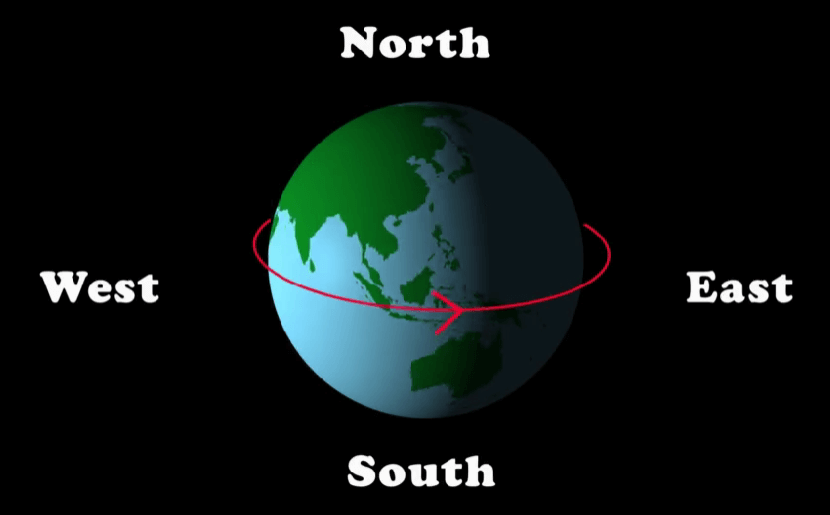
What is Revolution?
A revolution is the movement of one object around another in a fixed path. For example, the Earth revolves around the Sun. This movement takes one year or 365 days. The Earth’s path around the Sun is called its orbit, and it is oval-shaped. Revolution is very important because it causes seasons. When the Earth is closer to the Sun, it is summer, and when it is farther, it is winter. The revolution of Earth, combined with its tilted axis, makes different parts of the planet experience different weather. So, revolution means going around something in a circle or path, like the Earth going around the Sun.
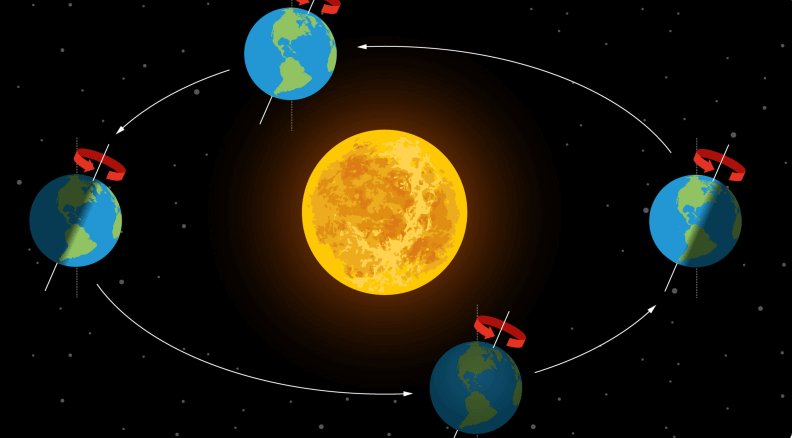
Difference Between Rotation and Revolution
The main difference between rotation and revolution is that rotation is when a planet spins around its own axis like the Earth spinning to create day and night. Revolution is when a planet moves around the Sun in a path called an orbit, which takes a year to complete, like Earth’s journey around the Sun. Other differences have been discussed below.
| Difference Between Rotation and Revolution | ||
| Aspects | Rotation | Revolution |
| Definition | The spinning of the Earth on its axis. | The movement of the Earth around the Sun. |
| Time Taken | Approximately 24 hours to complete one rotation. | Approximately 365.25 days to complete one revolution. |
| Direction | Occurs from west to east. | Moves in an elliptical orbit around the Sun in a counterclockwise direction. |
| Axis/Involvement | Takes place on its own tilted axis (23.5° tilt). | Involves the Earth moving along its orbital path around the Sun. |
| Effect on Day/Night | Causes day and night as different parts of Earth face the Sun. | Does not affect the daily alternation of day and night. |
| Effect on Seasons | Does not affect the seasons. | Causes seasons due to the tilt of the Earth’s axis and its position relative to the Sun. |
| Speed | Approximately 1670 km/h at the equator. | Approximately 107,000 km/h. |
| Reference Point | Rotation is relative to the Earth’s internal axis. | Revolution is relative to the Sun. |
| Celestial Observation | Causes the apparent movement of stars and the Sun across the sky. | Changes the constellations visible in the night sky over the year. |
| Gravitational Influence | Determines the shape of Earth as an oblate spheroid due to centrifugal force. | Determines the Earth’s distance variations from the Sun (perihelion and aphelion). |
Importance of Rotation and Revolution
The Earth’s rotation and revolution are very important for life. Rotation makes day and night by spinning the Earth on its axis in 24 hours. Revolution, which is the Earth’s movement around the Sun in one year, creates seasons. These movements help maintain a balance in temperature, light, and weather. Without rotation and revolution, life would not exist as we know it, as there would be no changes in time, seasons, or climate.
Importance of Rotation
- Day and Night Formation: Earth’s rotation on its axis causes the cycle of day and night, enabling life to experience light and darkness.
- Time Measurement: Rotation defines a day, providing the basis for timekeeping and daily schedules.
- Coriolis Effect: The Earth’s rotation influences wind and ocean current patterns, playing a crucial role in climate and weather systems.
- Temperature Regulation: By alternating exposure to sunlight, rotation helps moderate surface temperatures, preventing extreme conditions.
- Gravity Perception: Rotation creates centrifugal force, slightly reducing gravity’s effect at the equator compared to the poles.
- Astronomical Observation: Earth’s rotation allows us to observe the apparent movement of stars and planets, aiding astronomical studies.
Importance of Revolution
- Seasonal Changes: Earth’s revolution around the Sun, combined with its tilted axis, leads to the change of seasons.
- Agriculture Cycles: The revolution determines climatic variations, essential for farming and crop cultivation.
- Daylight Variation: Revolution affects the length of days and nights throughout the year, impacting ecosystems and human activities.
- Time Measurement: A complete revolution defines a year, forming the basis of calendars.
- Solar Energy Distribution: Revolution ensures balanced solar energy distribution, affecting weather patterns and global temperatures.
- Understanding Astronomy: The revolution helps scientists study celestial mechanics and the Earth’s relation to other celestial bodies.

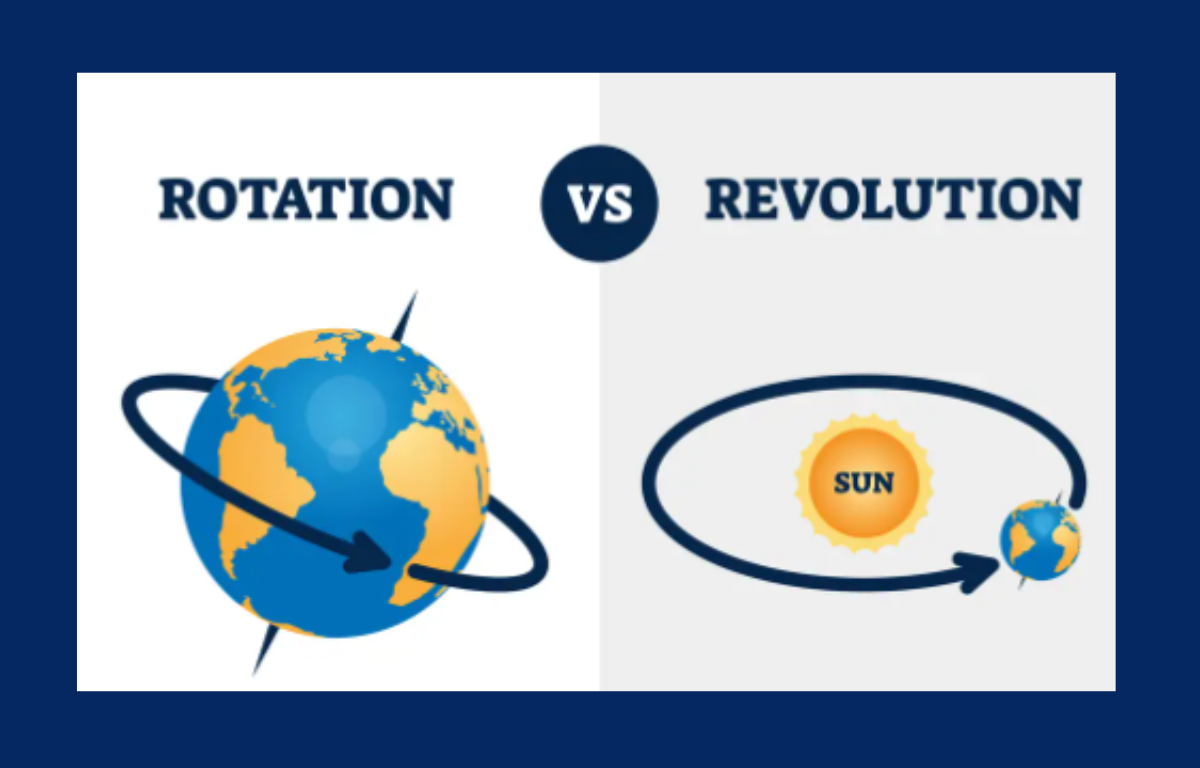

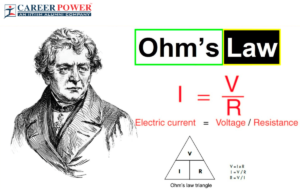 Ohm's Law: Definition, Formula, Limitati...
Ohm's Law: Definition, Formula, Limitati...
 Newton's First Law of Motion: Definition...
Newton's First Law of Motion: Definition...
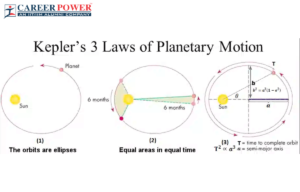 Kepler's Laws of Planetary Motion: First...
Kepler's Laws of Planetary Motion: First...













